ISTC and the European Commission’s Directorate General for International Cooperation and Development discuss with Kazakhstani counterparts future collaboration
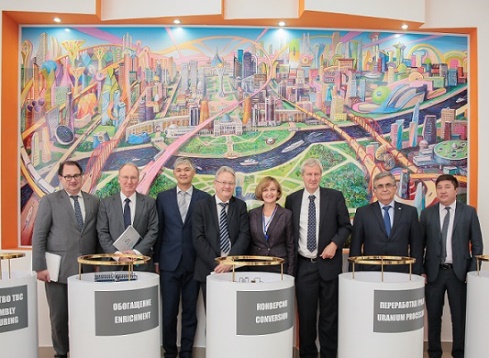
ISTC and the European Commission’s Directorate General for International Cooperation and Development discuss with Kazakhstani counterparts future collaboration
Astana, 17 October 2017. Representatives of the European Commission’s Directorate General for International Cooperation and Development (DG DEVCO) and the International Science and Technology Centre (ISTC), together with members of the EU Delegation to Kazakhstan held recently in Astana a series of discussions with Kazakhstani counterparts from ministries, public institutions and civil society organizations on opportunities and needs to deepen bilateral cooperation and collaboration.
On the eve of entry into force of the ISTC Continuing Agreement, interlocutors discussed how to make even more active Kazakhstan’s participation in ISTC transition, and, vice versa, to consider the possibility of ISTC to become an asset for Kazakhstan’s foreign policy. In view of the upcoming Kazakhstan chairmanship of the UN Security Council, the counterparts reflected on the potential of ISTC and ISTC-related projects to contribute to the implementation of the Kazakhstan priorities, in particular in non-proliferation and nuclear disarmament. Building on the achievements of a recent EU-funded P2P (Partner-to-Partner) project on dual use export control in Kazakhstan, the parties examined future partnerships and assessments of local needs in view of the preparation of a new regional project Export Control on Dual-use Materials and Technologies in Central Asia.
Representatives of the European Commission’s Directorate General International Cooperation and Development, (DG DEVCO) included Eddie Maier, Deputy head of Unit B/5 Stability, Security, Development and Nuclear Safety, Head of Sector CBRN, Adriaan van der Meer, advisor to the Instrument contributing to Stability and Peace (IcSP), and Wolfgang Lehofer, Policy Coordinator and Programme Manager, DG DEVCO. ISTC Secretariat was represented by David Cleave, Executive Director, Aidyn Turebayev, Deputy Executive Director, and Kamen Velichkov, Senior Program Manager and Diplomatic Advisor.
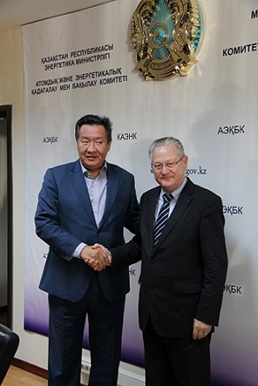 The Head of the EU Delegation to Kazakhstan Ambassador Traian Hristea joined the meeting at the Ministry of Energy hosted by Vice Minister Bakhytzhan Dzhaksaliyev. The EU-funded ISTC, although interacting on administrative matters with the Ministry of Education and Science, practically conducts most intensive cooperation with the National Nuclear Centre (NNC) and the Institute of Nuclear Physics (INP), both of which are working under the guidance of the Ministry of Energy. Therefore, the support of MoE to ISTC performance and transition are crucially important. Mr. Dzhaksaliev provided assurances that Kazakhstan will continue to participate in ISTC bilateral projects, as well as in projects in third countries. Special attention was attributed to the regionalization of the scope of activities of the NNC Identification Centre as a major goal of the new regional project Export Control on Dual-use Materials and Technologies in Central Asia. Having a Dual Use Identification Centre in Kurchatov is a good starting point to solicit commitment from the neighbouring countries and to create a new dynamic in the region, facilitating a coordinated fight against CBRN proliferation.
The Head of the EU Delegation to Kazakhstan Ambassador Traian Hristea joined the meeting at the Ministry of Energy hosted by Vice Minister Bakhytzhan Dzhaksaliyev. The EU-funded ISTC, although interacting on administrative matters with the Ministry of Education and Science, practically conducts most intensive cooperation with the National Nuclear Centre (NNC) and the Institute of Nuclear Physics (INP), both of which are working under the guidance of the Ministry of Energy. Therefore, the support of MoE to ISTC performance and transition are crucially important. Mr. Dzhaksaliev provided assurances that Kazakhstan will continue to participate in ISTC bilateral projects, as well as in projects in third countries. Special attention was attributed to the regionalization of the scope of activities of the NNC Identification Centre as a major goal of the new regional project Export Control on Dual-use Materials and Technologies in Central Asia. Having a Dual Use Identification Centre in Kurchatov is a good starting point to solicit commitment from the neighbouring countries and to create a new dynamic in the region, facilitating a coordinated fight against CBRN proliferation.
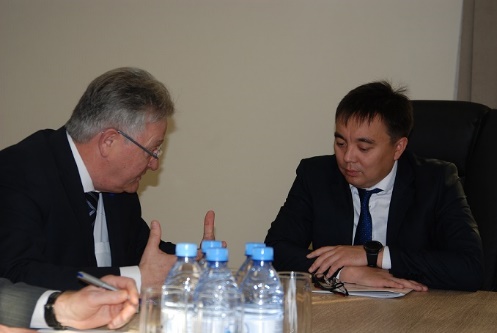 Vice Minister Aslanbek Amrin hosted the meeting at the Ministry of Education and Science. While the EU is thankful to the Kazakhstan government for hosting ISTC, Kazakhstan – in turn - perceives the cooperation within ISTC as part of the country’s strategic partnership with the European Union Mr. Amrin asserted that twenty-five thousand member strong researchers’ community is ready to partake in ISTC implemented projects in Kazakhstan. Some legal aspects of the upcoming entry into force of the ISTC Continuing Agreement came under scrutiny. Mr. Amrin stated that some of the ISTC projects in Africa may be helpful in promoting Kazakhstan expertise in the area of nuclear safety and security.
Vice Minister Aslanbek Amrin hosted the meeting at the Ministry of Education and Science. While the EU is thankful to the Kazakhstan government for hosting ISTC, Kazakhstan – in turn - perceives the cooperation within ISTC as part of the country’s strategic partnership with the European Union Mr. Amrin asserted that twenty-five thousand member strong researchers’ community is ready to partake in ISTC implemented projects in Kazakhstan. Some legal aspects of the upcoming entry into force of the ISTC Continuing Agreement came under scrutiny. Mr. Amrin stated that some of the ISTC projects in Africa may be helpful in promoting Kazakhstan expertise in the area of nuclear safety and security.
The meeting at the Ministry of Investment and Development (MID) was chaired by the First Vice Minister Alik Aydarbayev. The discussion focused on the partnership between ISTC and MID on the preparation of a new regional project Export Control on Dual-use Materials and Technologies in Central Asia, building on the achievements of the recent EU-funded P2P project on export control in Kazakhstan and regionalizing them by spreading good practices in eleven project-participant countries. At the recent meeting of the Australian Group, the EU has highlighted the P2P project’s outcomes, including the creation of a dual-use materials identification Centre in Kurchatov. EU disposes with experience in synchronizing national competences of its Member States in export control and the elaboration of common list at the EU level. This knowledge may be useful to Kazakhstan and other members of the Eurasian Economic Union. It was noted that ISTC is well positioned to mainstream the export control improvement in Central Asia and the Caucasus, ensuring the involvement of the academic and research communities.
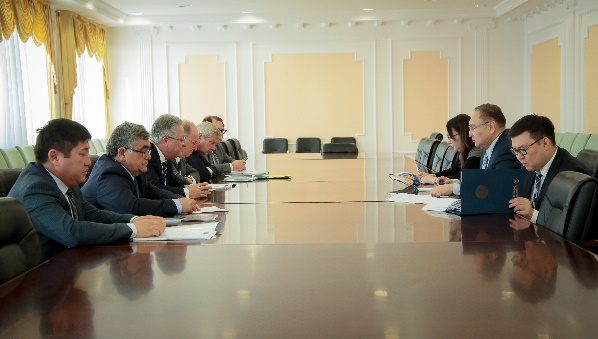
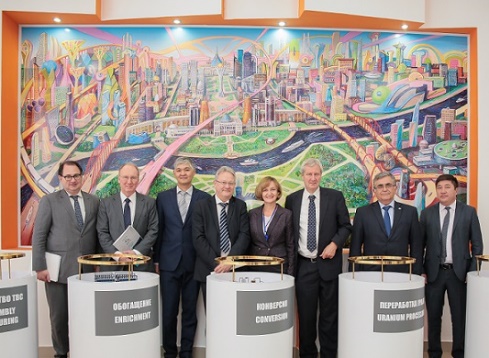 At the Ministry of Foreign Affairs Director Akan Rahmettulin, Head of Multilateral Cooperation Directorate (MCD) thanked the EU for the support provided in the field of export control. In addition to the creation of the country’s internal control system, Kazakhstan - through the project - will strengthen its arguments in favour of its candidacies for joining the international export control regimes. Director Rahmetullin welcomed the prospect for enlargement of ISTC membership, noting that the process will lead to synergies among diverse countries. The eminent entry into force of the new ISTC Agreement allows partners to move towards the next stage. Countries from the region and beyond may apply for the Status of Observer Party, and such states usually maintain excellent relations with Kazakhstan. Kazakhstan recently hosted the Ministerial meeting of the Forum for Nuclear Cooperation in Asia (FNCA), an organization comprised of Asian states that may benefit from working with ISTC. ISTC had a strong presence at EXPO 2017 and in future could be a useful implementation vehicle for activities in the area of nuclear security, also in view of the proposals for continuation of the Nuclear Security Summit process.
At the Ministry of Foreign Affairs Director Akan Rahmettulin, Head of Multilateral Cooperation Directorate (MCD) thanked the EU for the support provided in the field of export control. In addition to the creation of the country’s internal control system, Kazakhstan - through the project - will strengthen its arguments in favour of its candidacies for joining the international export control regimes. Director Rahmetullin welcomed the prospect for enlargement of ISTC membership, noting that the process will lead to synergies among diverse countries. The eminent entry into force of the new ISTC Agreement allows partners to move towards the next stage. Countries from the region and beyond may apply for the Status of Observer Party, and such states usually maintain excellent relations with Kazakhstan. Kazakhstan recently hosted the Ministerial meeting of the Forum for Nuclear Cooperation in Asia (FNCA), an organization comprised of Asian states that may benefit from working with ISTC. ISTC had a strong presence at EXPO 2017 and in future could be a useful implementation vehicle for activities in the area of nuclear security, also in view of the proposals for continuation of the Nuclear Security Summit process.
The visit to the Atomic Energy Information Center at the Palace of the Pupils provided the EU officials with opportunity to acquire impression from the public advocacy in favour of peaceful use of atomic energy, conducted by the Nuclear Society of Kazakhstan (NSK). The NSK Director Natalya Zhdanova, and collaborators of the Information Centre presented their public advocacy activities. With the help of ISTC, NSK established and maintains contact with the African Young Generation in Nuclear, an umbrella organization of young nuclear professionals from several African states.
At a working dinner organized for ISTC and the Forum for Nuclear Cooperation in Asia (FNCA), Mr. Eddie Maier made an offer to both FNCA coordinators and to ISTC States Parties to consider establishing appropriate forms of cooperation, possibly through a Memorandum of Understanding. The two organizations came into existence almost simultaneously and throughout more than quarter of a century have accumulated considerable lore of experience and achievements in similar areas of fundamental research and applied science.

